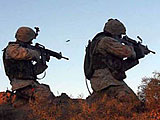Iraq: The consequences of war
By Anna Badkhen for ISN
In Stockholm this week, Iraqi Prime Minister Nouri al-Maliki and his ministers courted international donors, trying to convince them that Iraq is safe to go back to and open for business.
Compared to the bloodshed that peaked in Iraq last year, the country, indeed, seems much safer.
The Sunni insurgency, just recently the main perpetrator of violence in Iraq, is no longer a powerful anti-US or anti-government force; in fact, tens of thousands of Sunni tribesmen have joined a semi-official counterinsurgency militia financed by the US government.
Iraqi security forces may still be feeble and poorly trained, but they are no longer dominated by Shiite militias, which just a year ago were using their status to kidnap and execute Sunnis, secularists and people working - or suspected of working - with the Americans.
Even the powerful anti-American Shiite cleric Moqtada al-Sadr has worked out a cease-fire with the Iraqi government. Those who fled their homes when sectarian warfare was sweeping through neighborhoods last year are cautiously beginning to return.
But as they celebrate the long-awaited break in the violence (US military officials reported that May saw the fewest American deaths since the war began) Iraqi and US officials may be overlooking some consequences of five years of war that may prove more damaging to Iraq's long-term security than roadside bombs or street battles in Sadr City.
One of these threats is currently touted as a major diplomatic success: the creation of Sons in Iraq, the paramilitary force made up of members of Sunni tribes.
Each of the force's members gets US$300 a month from Washington. The force now includes more than 100,000 members, many of whom have fought against Americans and Shiite militias in the past. They stand on street corners in Sunni and religiously mixed neighborhoods, trying to prevent sectarian militias from taking over their neighborhoods.
The plan, so far, is to gradually fold about one-fifth of these militiamen into Iraqi security forces - but what will happen to the rest is less clear.
US officials say these men will be trained "to be contributors to the community," but do not explain what that means exactly. Potentially, some 80,000 armed and trained fighters suddenly will find themselves unemployed, or employed in jobs they do not want - and angry at the Iraqi government and the Americans because they didn't get picked for government service.
One US defense contractor who works as a cultural advisor to American commanders in Baghdad compared the setup to a dormant volcano.
The other threat is palpable already: the numerous Shiite militias that have splintered off al-Sadr's Mahdi Army and now operate on their own, not abiding by al-Sadr's ceasefire and attacking US and Iraqi government targets.
Americans believe these groups are responsible for frequent mortar attacks on some US military bases in Baghdad, and for occasional roadside bombs that target US convoys.
These splinter groups have infiltrated parts of Baghdad and keep entire neighborhoods under control by terrorizing local residents into providing the militants with financial support and safe haven, and scaring Iraqi government representatives from setting foot in the neighborhoods.
"It's the mafia operating by mafia rules," US Army Captain Sean Chase, whose soldiers are trying to weed out members of such splinter groups in a section of southwestern Baghdad, told ISN Security Watch.
The Iraqi government refuses to provide such basic services as garbage disposal to the area because it is afraid that the militants will attack its employees and steal the dump trucks.
But perhaps the most lingering threat to stability in Iraq is the psychological fallout of the sectarian violence of 2006 and 2007. Tensions between Sunnis and Shias have existed in Iraq for more than 1,000 years, but even as recently as 2005, members of the two Muslim sects lived next to each other in Baghdad's mixed neighborhoods.
Today, mixed neighborhoods are almost all gone - either taken over by members of one religious sect, or simply abandoned. Some former residents have moved to a different country or a different part of town to be closer to other members of their sect; others have moved a block or even a few houses down the road to make sure they are not surrounded by families of a different sect. Sunnis refuse to go to hospitals in Shiite neighborhoods because they are afraid of getting killed; Shias don't trust Sunni grocers. (See Letters from Iraq: Reconciliation, sort of, by Anna Badkhen for ISN Security Watch.)
Fueling this deep-seated resentment is the conflict over homes whose owners had fled at the height of the fighting. Often, the owners return to find their homes taken over by squatters - members of a different sect and refugees from a different part of town. Iraq's law on reconciliation and refugees prohibits such squatters from being forced out of their temporary dwellings, and lack of viable solution to the problem or resettlement adds to mutual hatred between the sects.
As Captain Chase put it: "That sectarian cleansing is almost done with, but there is still a taste."

